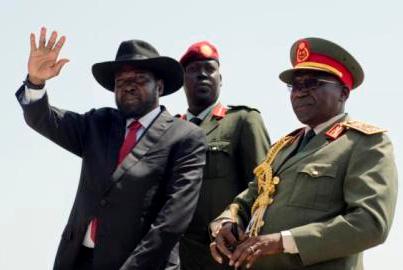S. Sudan lauds Russia for blocking sanctions against army chief
September 16, 2015 (JUBA) – South Sudanese government on Wednesday issued a statement commending Russia and Angola for rejecting imposition of targeted sanctions on the army’s chief of general staff and a former militia ally turned rebel commander.

“We are grateful as people and as the government of the republic of South Sudan for diplomatic support extended to us by the government of Russia and Angola at the United Nations Security Council,” said Gbandi.
He said it would be unwise and undesirable at this time to impose sanctions, whether targeted or not, when the government had demonstrated willingness to implement the peace agreement and end the conflict.
“We welcomed and commended these countries for standing with us at this critical and trying moment. We appealed for support not punitive measures because it would be unwise and undesirable decision,” he added.
The second top diplomat in the war-ravaged South Sudan explained that sanctions would complicate the situation in the region and might stand in the way of finding amicable solutions to resolving the issues through mutual understanding with support and cooperation of friends and assistances from the region and international community.
The comments come after the United States of America proposed through the UN Security Council sanctions committee that South Sudanese army chief Paul Malong and rebel commander Johnson Olony be placed to a global travel ban and asset freeze, but Russia, backed Angola, which is the only African nation and Venezuela which opposed the move.
Gordon Buay, one of the representatives of the government of South Sudan at its mission to the United States told Sudan Tribune during an exclusive interview shortly after the proposal was objected by the Russian government and two other countries that the rejection was an indication that the UN Security Council was now becoming a global organization.
“There were no basis for wanting to impose sanctions on the chief of general staff. There was nothing wrong he did to warrant imposition of a punitive measure against him”, said Buay.
The diplomat revealed that diplomatic efforts, which his government through its foreign offices in the United States and at the United Nations Security Council exerted in explaining the position of the government and its commitment, contributed to changing the mind of Russia to come out in their support against imposition of sanctions on military commanders.
“US officials had initially hoped they could push through a United Nations sanctions resolution, but our efforts at the embassy here and our colleagues at the permanent mission to the United Nations headquarters at the New York proved effective after managing to convince our allies at the Security Council. Russia came out and was followed by Angola and Venezuela. We are grateful for their support and commended them for demonstrating true friendship,” he said.
Unity state minister of youth, culture and sports, Lam Tungwar, in a separate interview with Sudan Tribune, commended the decision taken by Russia, Angola and Venezuela.
“As youth leaders from across South Sudan and in East African countries, appreciate and very much welcomed the support we received at the United Nations Security [Council] from the government of Russia, Angola and Venezuela. Sanctions are not means of resolving issues,” he said.
Army chief, Malong Awan was allegedly responsible for mobilization of the Dinka ethnic militia group and presidential guards that massacred civilians on 15 December 2013 in the national capital, Juba. He is also accused of violating the ceasefire agreement.
He and opposition’s top commander in Upper Nile state, Johnson Olony, were named in the draft resolutions as against the peace process.
(ST)
